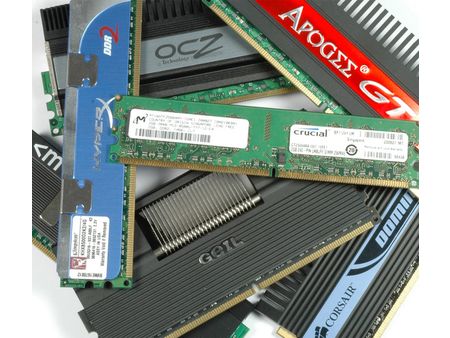Going For 4GB: DDR2-1066 Kit Round-Up
4 GB DDR2 Kits For the Masses
This is an excellent time to upgrade your main memory. Not only have memory prices come down to a level where 4 GB or even 8 GB of memory has become highly affordable, but a memory upgrade provides a positive impact with Windows Vista and an increasing number of game titles and applications. We looked at six 4 GB DDR2 memory kits, trying to find the best bang for the buck.
Intel will soon be releasing its Core i7 processor family, which will only support DDR3 memory due to the fact that the memory controller is about to be relocated from its traditional location on the northbridge right into the CPU. Combined with ramped-up production volumes, DDR3 memory has undergone significant price drops in recent months, finally making mainstream DDR3 memory attractive for the average Joe.
4 GB DDR2 Kits are Just Perfect
However, mainstream isn’t necessarily DDR3-1600 or faster, as many of you pointed out in the comments section of our recent DDR3-1600 roundup. It is DDR3-1066 and DDR3-1333. These are the speeds that have hit the market in ever larger quantities, to finally get to a point where DDR3 can take over from DDR2. However, this point is still pretty far away, looking at current memory prices for 2 GB and 4 GB memory kits, and the fact that even 8 GB kits have appeared at an almost acceptable cost. And let’s not forget that all AMD platforms depend on DDR2 memory (as do the majority of Intel systems).
While 4 GB of RAM cannot be fully utilized on 32-bit operating systems such as Windows XP and Windows Vista 32, you’ll still get between 3.3 and 3.7 GB of effective memory capacity. The exact figure depends on BIOS configuration, among other factors. We still believe that there is nothing wrong with purchasing a 4 GB dual channel memory kit, even if you won’t be able to utilize the entire capacity. Knowing that 2x 2 GB DDR2-800 kits start at as little as $80, that’s still a good deal.
Other Memory Options?
Utilizing more memory requires 64-bit versions of Windows XP or Vista, but the step from 3.3-3.7 GB usable capacity and the full 4 GB is small enough to be neglected in most of the applications today. 3+ GB of memory will provide sufficient capacity for 95% of all mainstream applications, and most of the high-end game titles as well. If you want more, you’ll have to switch the operating system, and that may still lead to driver issues. You’ll get 64-bit drivers for all core components, but the more you look around—think older printers, cell phone / smart phone drivers, and certain software—the more likely it is that you’ll get stranded in your quest for more memory.
Get Tom's Hardware's best news and in-depth reviews, straight to your inbox.
Although 8 GB memory kits (which consist of four 2 GB DIMMs) are affordable, these only make sense if you have applications that really take advantage of the increased memory capacity and if it is worth going through the 32 to 64 bit transition. But these kits might give you the same headache as 3 GB kits, because all of them include four memory modules. This may force the BIOS to work with relaxed timings and can cause memory compatibility issues. We put together a short recommendation list to help you navigate the memory jungle.
Check List
Here is our recommendation for memory purchases, which will remain valid even for the next generation platforms:
- Stay within the market sweet spot to get a good deal: today that’s 2x 1 GB or 2x 2 GB of DDR2-800 or DDR2-1066 memory.
- Look for quick timings (smaller numbers are better), but don’t spend substantial money on slightly faster modules.
- Spend additional budget on a faster processor, a faster graphics card or a faster drive instead of fast memory, unless you need overclocking memory.
- Always get as few memory modules as possible, but equip all memory channels of a system to get maximum performance. The ideal configuration consists of two DIMMs today, and three DIMMs with Intel’s upcoming Core i7 systems.
- Go for name brand memory.
More Articles
Tom’s Ultimate RAM Speed TestsWe cross-benchmarked DDR2 and DDR3 memory at various popular clock speeds and at both slow and fast timings. Is fast memory really worth it?
Current page: 4 GB DDR2 Kits For the Masses
Next Page Corsair Dominator TWIN2X4096-9136C5DF